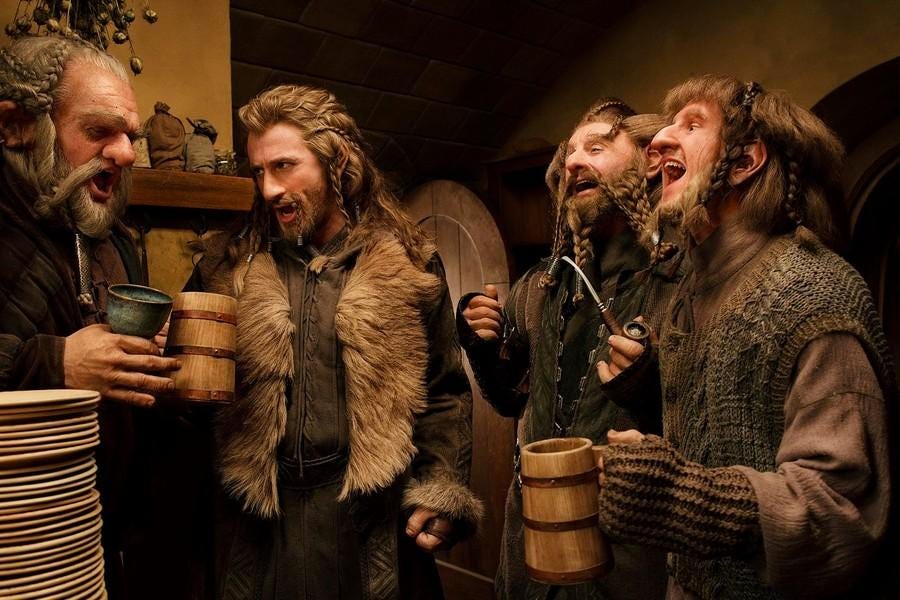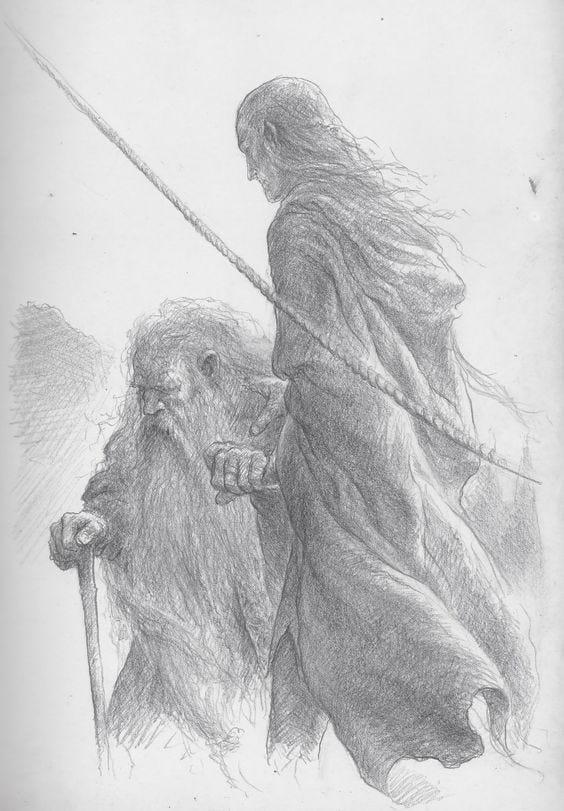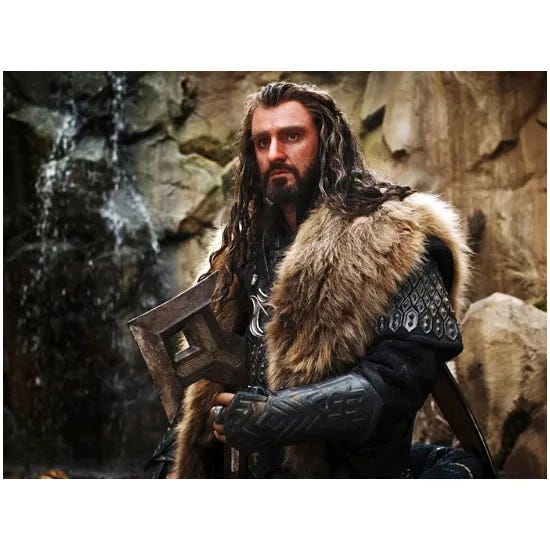Two Jews discuss the Jewishness of Dwarves: an Interview! (Part 1)
A follow up to my Tolkien Society Seminar paper
As many of you I’m sure already know, I presented a paper for the Tolkien Society Online Seminar (Tolkien and Religion in the Twenty-first Century) that was primarily about how the Dwarves in The Hobbit are deeply entrenched in Jewish stereotypes, both antisemitic and philosemitic, and how Tolkien’s clear effort to correct for his mistakes should not be dismissed but rather celebrated. This is going to be published in the proceedings, and can be viewed on Youtube! This paper was originally supposed to be about how we can find joy by seeing ourselves represented in Middle-earth, but I found I couldn’t even begin to discuss that without addressing the hotly debated elephant (or orangutan) in the room. This project is much bigger than intended, and maybe in a decade, I’ll gather everything together into a book.
For now, I wanted to share an interview I conducted with a friend of mine. The purpose of this interview was to get the perspective of another Jewish Tolkien fan, one who is more involved in both the faith and the culture than I am. Berakha Guggenheim is a Tolkien fan and yeshiva school graduate, with a background in archaeology and international affairs. I wanted to be sure that what I was observing was not wishful thinking or unique to me, and boy was I not disappointed. A lot of what Berakha brought up in this interview were the same thoughts that I had on the subject, and so I have cut out all the vehement agreeing and just let Berakha speak for herself. There are also some things I don’t quite agree with. This isn’t an academic essay, this is just another person’s perspective on the subject and one that I find valuable. What I felt worth sharing was the breadth of experience within the fandom around this subject that often gets lost to non-Jews, and that these points have been recognized within the Jewish fan community outside of just this one humble scholar.
I’ve decided to break it into two parts because it runs so long. Part 2 will come immediately after.
We discussed a whole lot of things in this conversation, including Tolkien’s complex relationship with Jews, fandom, The Hobbit films, Rings of Power and the value of representation. Please note that while this conversation was somewhat light and between friends, we do discuss serious issues of antisemitism as well as Zionism in relation to The Hobbit. This was unavoidable in this discussion, as it was unavoidable in my conference paper. While doing this work, and at the time of this post, the state of Israel has been committing ethnic cleansing and genocide against Palestinians in the name of Zionism. We must understand and grapple with the difference between Zionism as a pre-Israel concept and Zionism as a mechanism of Israeli Imperialism. The State of Israel does not represent Jews across the world, nor are all Jews Zionists, and I do not take this conversation lightly. I highly recommend reading the Jewitches article “The Three Israels” which clearly and accessibly explains the three different uses of the word Yisrael, and how they should not be conflated.
If you have the funds to do so, please consider donating to any Gazan relief fund, or any of the following organizations:
PCRF: Palestinian Children’s Relief Fund
Islamic Relief Fund
Amnesty International
Doctors Without Borders
Na’amod: British Jews Against Occupation
IfNotNow: American Jews Against Occupation
Anyway, on with the interview!
Mercury: I'm asking Jewish fans who relate to the dwarves: What it is that they relate with, what resonates with them. Tell me everything.
Berakha: Before I even start with that, I have two books next to me: One of them is a heavily bookmarked Letters of J.R.R. Tolkien. The other one is a book that I'm writing a class with because I talk a lot about antisemitism historically and in our modern games. The book is “Anti-Judaism: the Western Tradition” by David Nirenberg. It is not the only source for my class, but that being said, it’s written by a historian and he lays it out chronologically which is very useful as a framework. It's very accessible. The reason I mentioned that is because he breaks down some 2,500-year-old roots of antisemitism. His main theory so far as I understand it, and hopefully I'm not misunderstanding him, is that antisemitism is a particularly sticky form of bigotry because it's a useful lens which people deploy to understand the world around them. Kind of similar to how other bigotries work or other conspiracies.
Mercury: Orientalism is like this too.
Berakha: It's not that Jews are inherently magical. This of course leads us to Sartre: “If the Jew did not exist, the antisemite would invent him.” Why? Because we're more useful to other people as a prop for understanding the world around them than we are as people. This does show up in Tolkien's work, unfortunately, but Tolkien seems to have been unusually self-aware about the choices that he made and the implications that it has. Not completely, the man was born in the 19th century, but he does seem to draw a clear moral line. Why do I identify with dwarves? Because we were written to identify with dwarves. The dwarves are written to be us. He says that multiple times in his letters.
He clearly considers Jews and Christians on the same side in terms of Good and Evil, but in terms of… the Jews came first, but the Christians are chosen now (in his theology), so he had to work that into his mythology. The creation of the dwarves by Aulë, then put to sleep and then woken up again… he had to figure out the holes in his own Christian theology to make it applicable to his modern, faux-historical fantasy. But he also writes these beautiful notes [Letter #55] about how his Jewish comrade in arms [Cecil Roth] woke him up to make sure that he wouldn’t miss mass, and the kind of deep, grateful love that he felt for that action, that he said was a glimpse of an unfallen world. That's incredible. There really isn't a lot of room in Christian theology for Jews in an unfallen world like that.
I don't think Tolkien wrote out exactly to what extent he was wrestling with Christian theology, but I think it's very apparent about what happens with Gimli. Gimli essentially converts to Christianity. He goes off with the elves to Valinor. He's the only one who gets to do that. It is a very beautiful relationship, and it is very touching, but it's also deeply uncomfortable. Is the only salvation that he sees for the Jews one in which we ascend to a Christian level and go to a Christian heaven? Is that really the conclusion he comes to?
I think it's the conclusion the text comes to, but I don't think it's the conclusion that Tolkien comes to. We know that he was editing his works for the rest of his life. But one dwarf gets to go to Valinor and die there. That's seriously problematic, but I don't think Tolkien was wholly blind to that (unlike other British authors we can name, who have simply doubled down on their bigotry).
I have less of a problem with Tolkien and the “problematic” nature of his works than I do with the fandom. For the past nearly 100 years [since the publication of The Hobbit], there have been a lot of tropes in fantasy that ultimately derived from Tolkien, but that have done so in a way in that they're mimetically copy-pasted with no understanding of why Tolkien made the decisions that he did. There's also no understanding that when you copy-paste something problematic, it doesn't matter that you, the copy-paster, didn't intend it. There are going to be repercussions that come with your choices, whether you intended that or not.
When the Hobbit movies came out, there was a plethora of fix-it fanfiction, and they were just so antisemitic. I don't necessarily think they were all antisemitic because the authors hated Jews. I don't even think that they were trying to use the lens of the Jew to understand the world around them or the fiction around them. But these tropes are being mimetically reproduced, highlighted and strengthened in our culture because they didn't have the tools to engage critically with the text.
[ The conversation digressed to personal conversation but then returned to the topic at hand: ]
Berakha: I remember when the Hobbit movies were coming out, many Jews were calling it “Zionism the Movie”.
Mercury: Oh my God.
Berakha: I'm not defending that, by the way. I just remember some egregious shitposts. Jews who I wouldn't consider part of fandom immediately grasped that this movie was about them. If somebody who doesn't generally go to cons or cosplay looks at a movie that is about dwarves and says “This is about the Jews reclaiming our homeland”, then the movie is about the Jews reclaiming our homeland, right? The parallels that Tolkien laid out are not subtext at that point. They're just text. They're just the framework.
I was immensely grateful for the kind of pathos that the actors brought to that film. The fact that Richard Armitage portrayed such a deeply flawed character, one who reinforces antisemitic stereotypes, with such an incredible amount of care… I think understanding the amount of pain and loss involved in navigating a people exiled, navigating your people through political splits, navigating your people to trying to find stability… so much love and care goes into navigating that. After being decimated by fire? The Roman parallels are not exactly hard. I don't think anybody here is like, yeah, Romans burning the temple, woohoo. I don't think anybody here is going to be doing that. This is a deeply traumatic historical memory that affects the Jewish people to this day.
This is a trauma that is carried with us and has informed other traumas, even as they keep piling up because that’s life on planet Earth. I thought they handled that in a way that helped to minimize some (but not all) of the problematic aspects of Jewish characterization in The Hobbit. I think the movie also reproduced some of the problematic elements. I'm not sure there's a really good way to navigate out of it. I don't have an answer, but I appreciated that Thorin was not portrayed as a villain. He was portrayed as somebody who loves his people so much, as someone flawed, but who ended up giving his life for his love. There's a lot of nobility in the portrayal.
I think the portrayal of Jews or Jewish-coded characters often takes a pass on any potential nobility. We are usually written as characters for Christians to emote off of, whether noble or ignoble, but we are not noble in of ourselves. And I do think that the film portrayals showed a lot of nobility that often gets left out.
Mercury: Thorin is one of my least favourite characters in Middle-earth, for so many obvious reasons. I do think that the film version of Thorin is a far superior version of him than what Tolkien actually wrote. It’s just so much better.
[ That’s all for this part, find part 2 HERE!]







Thank you so much for sharing this! I loved your paper and I keep recommending it, and I appreciate having another perspective to read <3